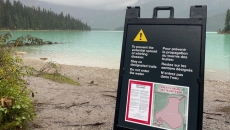Rail commuters in British Columbia's Lower Mainland must find alternative transportation after Canada's two major railways locked out workers in their first-ever simultaneous stoppage.
A bulletin from TransLink, Metro Vancouver's transportation network, says service on the West Coast Express is suspended due to the stoppage, which follows a break down in talks with the union.
Good morning folks, we've made it to Thursday and that means the weekend is right around the corner! #WCE service is suspended due to an ongoing nationwide labour dispute at CPKC. There are other travel options, including supplemental bus service: https://t.co/85I2kFJiEv ^CK
— TransLink BC (@TransLink) August 22, 2024
The line serves communities between Vancouver and Mission, about 67 kilometres to the east, with stops in the Maple Ridge, Pitt Meadows and Coquitlam areas.
Bargaining between railworkers and Canadian National Railway and Canadian Pacific Kansas City was set to resume this morning after breaking off shortly before a midnight deadline that left the workers locked out by their employers.
TransLink says there is supplemental bus service during the stoppage.
In a statement, TransLink says the bus service went well during the morning commute, although they don't have figures about how many people used it.
It says more than 3,000 customers take the West Coast Express each weekday.
The nationwide impasse affects upwards of 32,000 commuters in Toronto, Montreal and Vancouver, whose lines run on CPKC-owned tracks.
Passenger trains cannot roll along those rails without the locked-out traffic controllers to dispatch them.
The president of the Greater Vancouver Board of Trade, Bridgitte Anderson, says thousands of workers who rely on the West Coast Express have been forced to find alternative transportation, adding to congestion across the region.
“Every day of this stoppage delivers another blow to people’s wallets, endangering the livelihoods of small business owners and employees across the country.” - @BridgAnderson
— Greater Vancouver Board of Trade (@BoardofTrade) August 22, 2024
Read our statement on the work stoppage at Canada's major railway companies ⬇️https://t.co/vz54EV2CUY pic.twitter.com/0jPottqNaO
Fiona Famulak, president of BC Chamber of Commerce, similarly says the group is "extremely disappointed" that the parties haven't been able to reach a deal.
She says a prolonged stoppage is "untenable," and would further damage B.C.'s reputation as a reliable trading partner after job action at western ports last year.
Public transit advocates in Vancouver, Montreal and Toronto issued a joint statement saying the stoppage shows rail users are "at the mercy of freight transportation" in Canada.
The statement from Trajectoire Québec, TTCriders and Movement: Metro Vancouver Transit Riders says public transit users are paying for a situation out of their control.
It says the stoppage will encourage more transit riders to use cars to get to work and affect public confidence in the reliability of commuter trains, which they describe as "fragile."
"This situation is unacceptable in the context of growing congestion and a climate crisis," the statement says.
Blair Qualey, president and CEO of the New Car Dealers Association of BC, said his group was joining other business associations across Canada to call on the federal government to step in to restart rail services that he said were "vital."
Otherwise, they would struggle to keep their doors open amid the “very challenging situation.”
Qualey said in a statement that car dealers were already dealing with tight inventory and the rail stoppage would “turn the tap off.”
"Previous disputes have had a significant impact on dealers and consumers, and we simply cannot afford a repeat," said Qualey.






